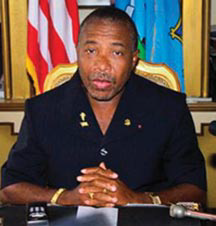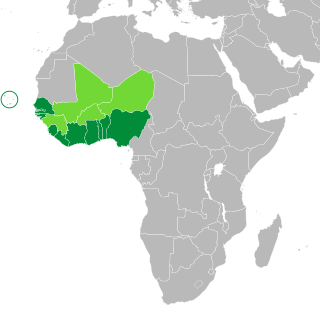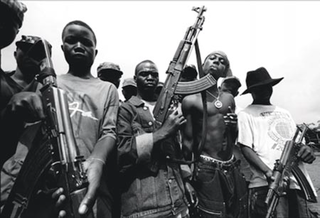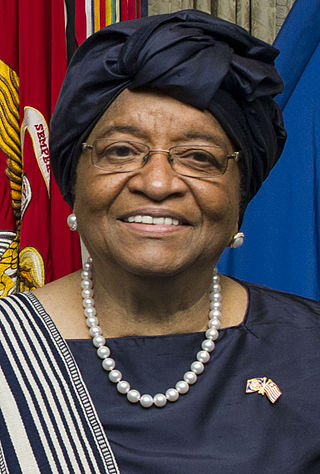Related Research Articles

Liberia is a country in West Africa founded by free people of color from the United States. The emigration of African Americans, both freeborn and recently emancipated, was funded and organized by the American Colonization Society (ACS). The mortality rate of these settlers was the highest among settlements reported with modern recordkeeping. Of the 4,571 emigrants who arrived in Liberia between 1820 and 1843, only 1,819 survived (39.8%).

The Politics of Liberia takes place in a framework of a presidential representative democratic republic modeled on the government of the United States, whereby the President is the head of state and head of government; unlike the United States, however, Liberia is a unitary state as opposed to a federation and has a pluriform multi-party system rather than the two-party system that characterizes US politics. Executive power is exercised by the government. Legislative power is vested in both the government and the two chambers of the legislature.

Charles McArthur Ghankay Taylor is a Liberian former politician and convicted war criminal who served as the 22nd president of Liberia from 2 August 1997 until his resignation on 11 August 2003 as a result of the Second Liberian Civil War and growing international pressure.

Samuel Kanyon Doe was a Liberian politician and military officer who served as the 21st President of Liberia from 1986 to 1990. He ruled Liberia as Chairman of the People's Redemption Council (PRC) from 1980 to 1986 and then as president from 1986 to 1990.

Prince Yormie Johnson is a Liberian politician and former warlord who has served as a senator for Nimba County since 2006. A former rebel leader, Johnson played a prominent role in the First Liberian Civil War.

The president of the Republic of Liberia is the head of state and government of Liberia. The president serves as the leader of the executive branch and as commander-in-chief of the Armed Forces of Liberia.

The First Liberian Civil War was the first of two civil wars within the West African nation of Liberia which lasted between 1989 and 1997. President Samuel Doe's regime of totalitarianism and widespread corruption led to calls for withdrawal of the support of the United States, by the late 1980s. The National Patriotic Front of Liberia (NPFL) led by Charles Taylor invaded Liberia from the Ivory Coast to overthrow Doe in December 1989 and gained control over most of the country within a year. Doe was captured and executed by the Independent National Patriotic Front of Liberia (INPFL), a splinter faction of the NPFL led by Prince Johnson, in September 1990. The NPFL and INPFL fought each other for control of the capital city, Monrovia and against the Armed Forces of Liberia and pro-Doe United Liberation Movement of Liberia for Democracy. Peace negotiations and foreign involvement led to a ceasefire in 1995 but fighting continued until a peace agreement between the main factions occurred in August 1996. Taylor was elected President of Liberia following the 1997 Liberian general election and entered office in August of the same year.

The Economic Community of West African States Monitoring Group (ECOMOG) was a West African multilateral armed force established by the Economic Community of West African States (ECOWAS). ECOMOG was a formal arrangement for separate armies to work together. It was largely supported by personnel and resources of the Nigerian Armed Forces, with sub-battalion strength units contributed by other ECOWAS members — Ghana, Guinea, Sierra Leone, The Gambia, Liberia, Mali, Burkina Faso, Niger, and others.
Ruth Sando Fahnbulleh Perry was a Liberian politician. She served as the interim Chairman of the Council of State of Liberia from 3 September 1996 until 2 August 1997, following the First Liberian Civil War. After eleven international peace attempts between 1990 and 1995 to end the civil war in Liberia, the attempts appeared to succeed. The interim Council of State consisted of a civilian chairman, as well as members of warring factions: Charles Taylor, United Liberation Movement of Liberia for Democracy-K leader Alhaji Kromah, Liberia Peace Council leader George Boley, and two other civilians.

The Second Liberian Civil War was a civil war in the West African nation of Liberia that lasted from 1999 to 2003.
The National Patriotic Front of Liberia (NPFL) was a Liberian rebel group that initiated and participated in the First Liberian Civil War from 24 December 1989 – 2 August 1997. The NPFL emerged out of rising ethnic tensions and civil unrest due to the Liberian government that was characterized by totalitarianism, corruption, and favoritism towards ethnic Krahns. The NPFL invaded Liberia through Ivory Coast’s border with Nimba County in Liberia under the direction of Charles Taylor, a former Liberian politician and guerrilla leader who served as the 22nd president of Liberia from 2 August 1997 until his resignation on 11 August 2003.

The Independent National Patriotic Front of Liberia (INPFL) was a rebel group that participated in the First Liberian Civil War under the leadership of Prince Johnson. It was a breakaway faction of the National Patriotic Front of Liberia (NPFL).

Ellen Johnson Sirleaf is a Liberian politician who served as the 24th president of Liberia from 2006 to 2018. Sirleaf was the first elected female head of state in Africa.

General elections were held in Liberia on 11 October 2011, with a second round of the presidential election on 8 November. The presidency, as well as all seats in the House of Representatives and half of the seats in the Senate, were up for election. The election was overseen by the National Elections Commission (NEC).

Women of Liberia Mass Action for Peace is a peace movement started in 2003 by women in Monrovia, Liberia, Africa, that worked to end the Second Liberian Civil War. Organized by Crystal Roh Gawding and social workers Leymah Gbowee and Comfort Freeman, the movement began despite Liberia having extremely limited civil rights. Thousands of Muslim and Christian women from various classes mobilized their efforts, staged silent nonviolence protests that included a sex strike and the threat of a curse.
Mae Azango is a Liberian journalist for FrontPage Africa. She is particularly known for her reports on female genital mutilation (FGM), which helped suspend the practice in the nation. In 2012, she was awarded the International Press Freedom Award of the Committee to Protect Journalists.
The West Africa Network for Peacebuilding (WANEP) is a leading Regional Peacebuilding organisation founded in 1998 in response to civil wars that plagued West Africa in the 1990s. Over the years, WANEP has succeeded in establishing strong national networks in every Member State of ECOWAS with over 550 member organisations across West Africa. WANEP places special focus on collaborative approaches to conflict prevention, and peacebuilding, working with diverse actors from civil society, governments, intergovernmental bodies, women groups and other partners in a bid to establish a platform for dialogue, experience sharing and learning, thereby complementing efforts at ensuring sustainable peace and development in West Africa and beyond.
Dorothy Harriet Eugenia Musuleng Cooper was a Liberian educator, politician and the first woman to serve as Foreign Minister in Liberia. She was born at Arthington, Liberia and obtained her B.S. and M.S. from College of West Africa and San Francisco State University respectively. She worked as a school teacher between graduation and high school and matriculation in 1964 in San Francisco in 1964, curriculum development in the Ministry of Education, and principal of Cuttington University College. She was an education minister in Charles Taylor's shadow government from 1990 to 1993 in the National Patriotic Reconstruction Assembly Government

The 1980 Liberian coup d'état happened on April 12, 1980, when President William Tolbert was overthrown and murdered in a violent coup. The coup was staged by an indigenous Liberian faction of the Armed Forces of Liberia (AFL) under the command of Master Sergeant Samuel Doe. Following a period of transition, Doe ruled Liberia throughout the 1980s until his murder in 1990 during the First Liberian Civil War.
Events in the year 2016 in Liberia.
References
- 1 2 Dunn, Elwood D.; Beyan, Amos J.; Burrowes, Carl Patrick (2000). Historical Dictionary of Liberia. p. 111.
- ↑ Azango, Mae (10 January 2018). ""Nancy Doe Market Is For Market Women Not Ecobank" – Nancy Doe". FrontPage Africa . Retrieved 11 September 2022.
- ↑ Jet. Vol. 65. Johnson Publishing Company. 5 March 1985. p. 22.
- ↑ Azango, Mae (23 August 2018). "Liberia: Wife of Slain Pres. Doe Accuses Senator Sherman of Seizing Her Property". FrontPage Africa . Retrieved 11 September 2022.
- ↑ "ECOWAS Court Orders Liberian Gov't to Pay US$18M as Compensation to Nancy Doe". FrontPage Africa. 16 March 2019. Retrieved 11 September 2022.
- 1 2 Genoway, Edwin Jr. (5 August 2020). "Liberia: Ex-Pres. Doe Wife Wants Him Reburied; Pleads with Govt. For Due Benefits". FrontPage Africa . Retrieved 11 September 2022.